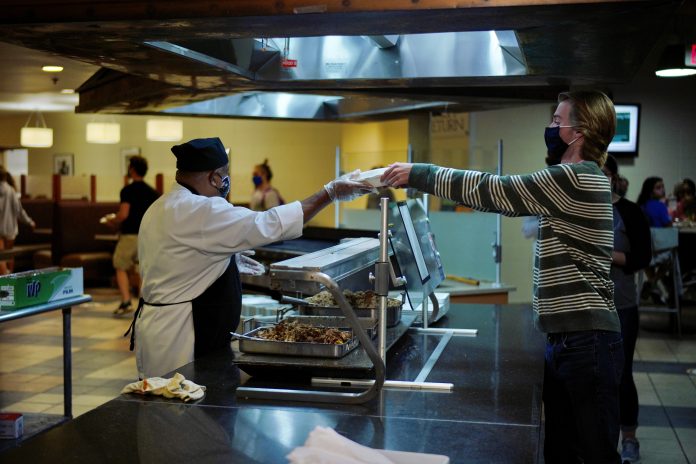Thursday, Jan. 14, the College of William and Mary announced all dining services will be carry-out only until Feb. 10. This announcement was sparked by a recommendation from the College’s Public Health Advisory Team and reflects current public health concerns related to COVID-19.
The College’s Public Health Advisory Team continually monitors COVID-19 positivity rates, hospital capacity and other critical public health data on campus and in Williamsburg before making decisions and recommendations. The team was involved in the new dining hall regulations.
In a written statement, College spokesperson Suzanne Clavet described the decision-making process behind the change to takeout meals.
“William & Mary’s Public Health Advisory team has advised strict adherence to the university’s Healthy Together Commitment and, for at least the early part of the spring semester, has recommended limiting indoor dining,” Clavet said. “PHAT regularly monitors national, state and local health data and advises decision-makers across campus regarding any decisions related to the health of the campus community. This is the same process that was in place in the fall.”
According to the College’s COVID-19 Dashboard for the spring 2021 semester, 33 students and one faculty member have tested positive for COVID-19 before returning to campus. On campus, there has been one student positive case and one faculty positive case. As of Jan. 25, 2,965 students and 490 staff members have been tested for Covid-19 for the spring semester.
While administrators are prioritizing the health and safety of students and staff as the spring semester begins, some students fear that tighter restrictions may limit students’ abilities to meet people on campus and grow their social circles.
Tara Kerr ’24, who plays on the College’s lacrosse team, moved back onto campus for the spring semester Jan. 15. After experiencing the College’s restrictions for a week, Kerr described the isolation that the dining hall changes could cause, especially for freshmen who are still navigating social life at the College.
“I totally understand why, because in the fall you could sit at a table with somebody who lived in a different dorm than you without a mask on and potentially spread the virus,” Kerr said. “It’s also indoors so circulation is more difficult. So, I totally understand why. But at the same time, it is sad and especially as a freshman who hasn’t experienced how social college is supposed to be, I think it is going to be tough. I think it’ll be especially hard for people who don’t have a ton of friends who live near them.”
Kerr also discussed how new restrictions have affected her team’s morale and the schedules of Tribe sports teams, particularly in creating bonding among teams.
“A lot of coaches across the board were frustrated,” Kerr said. “I know our coach was hoping we would be able to do a team meal in Caf, especially since it’s kind of chilly in the winter.”
“A lot of coaches across the board were frustrated,” Kerr said. “I know our coach was hoping we would be able to do a team meal in Caf, especially since it’s kind of chilly in the winter.”
The timing of the new regulation poses a challenge to students as they decide when and where to eat. Cold weather in January and February limits the feasibility of outdoor dining on campus. Also, as Kerr mentioned, club and team dinners are more difficult to organize because outdoor gathering numbers are limited.
The roles of dining hall workers are also evolving in response to the new regulations. Since indoor dining is prohibited, workers will be cleaning fewer tables and washing fewer student dishes, and they also will no longer have to enforce seating and social distancing guidelines.
Reflecting on the changing roles of dining hall workers this semester, Resident District Manager Jason Aupied discussed how the College’s changes will affect dining hall employees during the spring.
“The switch to all to-go dining has not affected the pay of workers,” Aupied said. “Our staff are being cross-trained and will be working in multiple locations to maintain their employment status.”
“The switch to all to-go dining has not affected the pay of workers,” Aupied said. “Our staff are being cross-trained and will be working in multiple locations to maintain their employment status.”
During fall 2020, the dining hall staff reportedly did well in preventing the spread of COVID-19.
“All members of the W&M Dining team were tested for COVID before returning to campus in the fall and again in the spring,” Aupied said. “We are also a part of weekly prevalence testing. Other mitigation factors include configuring workstations to allow for physical distancing, requiring face coverings in the workplace, daily health monitoring, physical barriers in high contact areas like cashier stations, staggering of shifts to reduce cross contact and increased sanitizing of high touch areas. While there were a minimal number of cases amongst the dining team in the fall, none of those were determined to be work related.”
As the spring semester begins, the College hopes to maintain the level of success that the campus had in the fall with controlling the spread of COVID-19 – a big task given the pandemic’s worsening severity across the United States.
“We were one of the only lacrosse teams in the region to make it the whole semester without any cases,” Kerr said. “We got to contact which was the final phase. So shoutout to William and Mary students, I was definitely proud of our school coming home for break.”





























